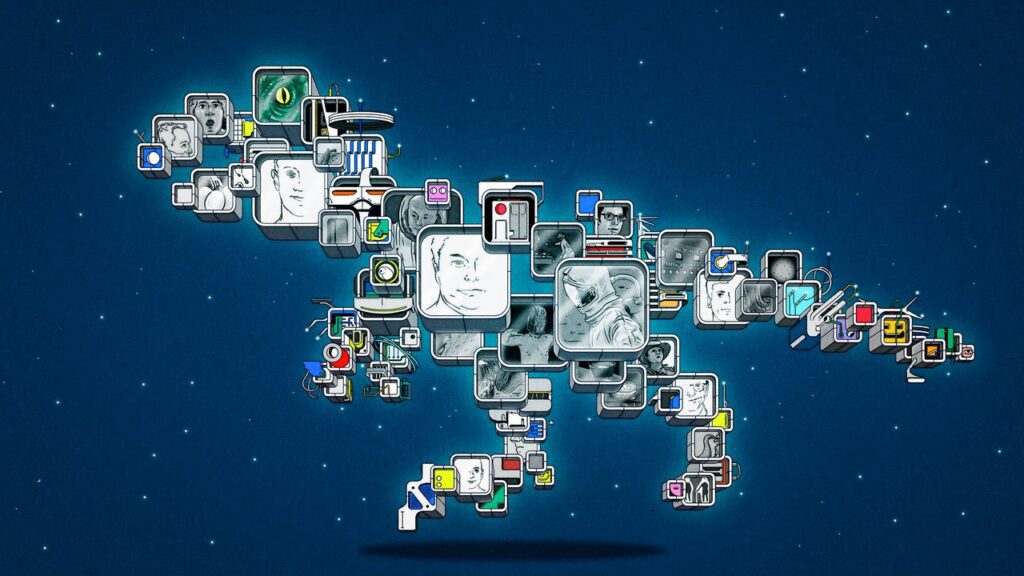Revisiting the Tech Narratives: Are We Learning from Michael Crichton?
This week’s Infinite Scroll offers a fresh perspective as Cal Newport takes the reins from Kyle Chayka.
Let’s journey back to 1968, when a young Michael Crichton, an aspiring author still navigating the halls of Harvard Medical School, submitted a manuscript with the intriguing title “The Andromeda Strain.” This fast-paced novel centers around scientists working in an ultra-secret lab, unraveling the mysteries of a lethal extraterrestrial organism brought back to Earth by a crashed space probe. Interestingly enough, Crichton drew inspiration from a footnote in his biology textbook that pondered the existence of microorganisms in the upper atmosphere. After enduring years of drafting—where each attempt failed to satisfy—he received a breakthrough idea from NASA: the existence of a stringent quarantine protocol related to moon missions. This insight ignited Crichton’s creativity and set the stage for his chilling debut.
However, the path to publication wasn’t straightforward. Robert Gottlieb, the newly appointed editor at Knopf, suggested a complete overhaul. Rather than weaving a conventional narrative centered on character development, Gottlieb encouraged Crichton to strip away the emotional layers and present the story as a documentary-style account. This bold pivot led to the book being embraced as a "cold" depiction of a technology-driven plot, stripping the narrative of embellishment and focusing instead on the plot’s chilling realism.
The outcome was undeniably successful. “The Andromeda Strain” earned rave reviews for its “hideously plausible suspense” and quickly ascended the New York Times best-seller list. The buzz even caught the attention of Hollywood, with Universal Pictures purchasing the film rights for a whopping quarter-million dollars—a sum equivalent to over two million today. Crichton eventually shelved his medical aspirations, stepping into the limelight as a full-time writer and director. Gottlieb’s advice remains relevant today: sometimes technology itself becomes the central character in a narrative, rather than the creators or users who employ it.
Fast forward to today, and we seem to have deviated from this insight. The rise of tech giants like Meta (previously Facebook) and X (formerly Twitter) has not only commodified our attention but has also heightened political polarization and clouded our grasp on the truth. Yet, in discussing these challenges, we often hone in on individual figures—think Elon Musk’s public antics or Mark Zuckerberg’s recent “masculine energy” persona—while neglecting to critically examine the technology and systems at play.
While it’s crucial to hold public figures responsible, casting these techno-dramas through a human lens may obscure the underlying issue: the technologies themselves. Technologies can evolve and operate independently beyond the designers’ intention. As Twitter’s decline prompted users to ponder better platforms like Threads or Bluesky, a more pertinent inquiry is whether we genuinely want these technologies to permeate our lives at all.
In a thought-provoking New York Times review of Crichton’s iconic “Jurassic Park,” critic Christopher Lehmann-Haupt noted how its dinosaur-laden plot echoes themes from Mary Shelley’s “Frankenstein.” Both stories explore reanimation and the chaos that ensues, yet Crichton offers a refreshing shift in focus. Instead of honing in on individual character escapades, “Jurassic Park” examines technology itself as the narrative’s core, inviting readers to feel both exhilaration and terror at its potential.
Whereas Shelley framed her narrative around the tragic human experience of ambition gone awry, Crichton de-emphasizes character-driven storytelling. He invites readers to explore the ramifications of technological advancement, particularly through the eyes of various characters, which dilutes the notion of a sole hero. And while characters like John Hammond, the well-meaning yet oblivious founder of Biosyn genetics, are central to the story, the real protagonist is the advanced technology that spins the plot into chaos.
It appears we’ve returned to a Shelleyesque narrative style in modern assessments of technology. News articles often focus on the personalities behind tech controversies, diverting attention from the systemic issues at hand. In the case of email, for instance, frustrations often funnel toward managers believed to be generating workloads instead of understanding how the design of the tool itself fosters overcommunication. Similarly, the disarray seen in the social media landscape reflects intrinsic issues within the technology rather than solely the eccentricities of its creators.
Looking at advanced technologies such as AI, discussions frequently shift toward the personalities involved—like Altman and Musk—ignoring the chaotic ramifications of broader technological systems. The landscape mirrors the early chapters of a Crichton thriller, with industry ‘John Hammonds’ celebrating advancements while concerns grow among experts over the associated risks.
Yet, unlike the fictional disasters in Crichton’s works, our reality allows for proactive choices. If we’re concerned about the ramifications of powerful technologies, we need to consider regulations and strategies that keep us out of harm’s way. For instance, could we develop smaller, tailored AI models that address specific tasks instead of all-encompassing applications?
“The Andromeda Strain,” released amidst the excitement of NASA’s moon missions, offered a glimpse into potential technological nightmares. It warned against blind optimism in pursuing tech advancements, reminding us to reassess our fervent aspirations when faced with real dangers.
In conclusion, the lessons of Crichton’s narratives remain vital. As we navigate the world of emerging technologies, it’s crucial to question not just who’s at the helm but how the technologies themselves function and whether they truly benefit us. Are they liberating or limiting? Instead of being ensnared by personalities, let’s embrace a more technology-centric conversation about the tools that shape our lives.
The AI Buzz Hub team is excited to see where these breakthroughs take us. Want to stay in the loop on all things AI? Subscribe to our newsletter or share this article with your fellow enthusiasts.




